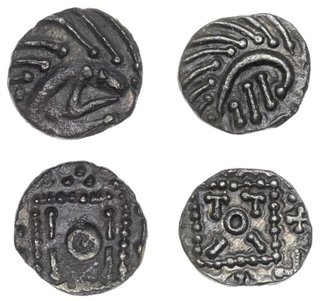In the first decade of the 7th century, King Aethelburht of Kent laid down on parchment the first set of Legal Codes that survive from the Anglo-Saxon period. The codes still exist although in a copied volume of law codes and genealogical records called the “Textus Roffensius” – the Rochester Book – which was made and held at Rochester Cathedral around 1120. This document gives us our first glimpse of laws and legal traditions from the Saxon Period.

One fundamental principle of these law codes that date back to Germanic and Anglo-Saxon traditions is that of Weregild and compensation. In essence these laws laid down the means whereby a man guilty of a crime would be expected to pay a fine to the victim. In our modern world where first of all we look to punish crime by imprisonment or (until the 1960’s) death in the case of murder, the Saxons took an approach that tried to avoid a blood feud.
To understand this one has to think back on years where these law codes evolved. In the chaotic and bloody years of the Anglo-Saxon settlement and probably drawing from earlier traditions in the Germanic homelands when there was no real legal structure, it would be very easy for harm to a man to be avenged by the victim’s family. This could easily lead to tit for tat retaliation. So in those years the principle of a ‘weregild’ evolved meaning literally man’s worth . Every man has their weregild. If they died at another man’s hand the value of this would be paid to avoid retribution.
For centuries the exact values of weregild were recorded and passed on orally or if written down we have no record of it. This first legal code of Aethelbehrt gives us a snapshot of these fines as they existed during his time.
‘If someone slays another man he shall pay-over a proper compensation of 100 shillings.’ The code even goes on to specify that 20 shillings must be paid over the grave as the man was being buried and the rest within 40 days.
Not all men are born equal in these codes. A slave killed would leave to compensation of between 40 and 80 shiilings dependent on the value of the slave.

The law codes are incredibly elaborate and do not just talk of fines for murder. In fact they go on to specify just about every conceivable injury:
‘If the ear is pierced the compensation shall be 3 shillings’
‘If the eye is put out the aggressor shall pay in compensation 50 shillings’
‘For each finger nail, a shilling’
There is even an attempt to establish rules for separations:
‘Is she (a wife) wishes to leave with the children let her have half the money’
and adultery:
‘If one freeman lies with another’s wife he shall render the weregild (code is not clear how much) and procure with his own money and second wife for the man. ‘
The codes also cover property damage, trespass and other areas of non violent crime:
‘If someone is first to force his way into someone else’s premises he shall pay in compensation 6 shillings, the next 3 and each subsequent man 1 shilling’
‘If someone seizes goods whilst inside he shall pay back three fold’
These codes do something else which is vital in the development of the land that will one day be called England. It establishes the authority of the King, places the king at the heart of the law and also provides revenue for the crown. Many of the codes deal with much larger and heavier fines due to the King in the event of harm to him or his property or household:
‘If a freeman steals from the king he shall pay back ninefold.’
Any crime committed near the king, in his presence or even in the same locality whilst he was resident would lead to fines being paid to the king in addition to the weregild going to the family of the victim. A king was entitled to compensation for every freeman killed. ’50 shillings shall go to the king as compensation for loss of a subject’
This approach did not just extend to the King. Aethelburht was the first Anglo-Saxon King to convert to Christianity and, mindful of potential threat to the incoming missionaries from reluctant Saxons, he enshrined within his codes protection for the church and its property: ‘God’s property will be compensated 12 fold’ This meant he was placing a very clear higher value on he church than himself.
What we see here is the beginnings of a formalization and drawing under state control the legal systems. Later codes such as those of Alfred the Great and others would establish legal courts and elaborate on these basic codes but this set of laws written 14 centuries ago are the earliest striving towards an orderly state that we have any record of.
There is a superb book on this subject called Early English Law by Bill Griffiths. Weregild is a theme in The Amber Treasure – a story of Treachery in Dark Ages Northumbria.


Related Articles
No user responded in this post